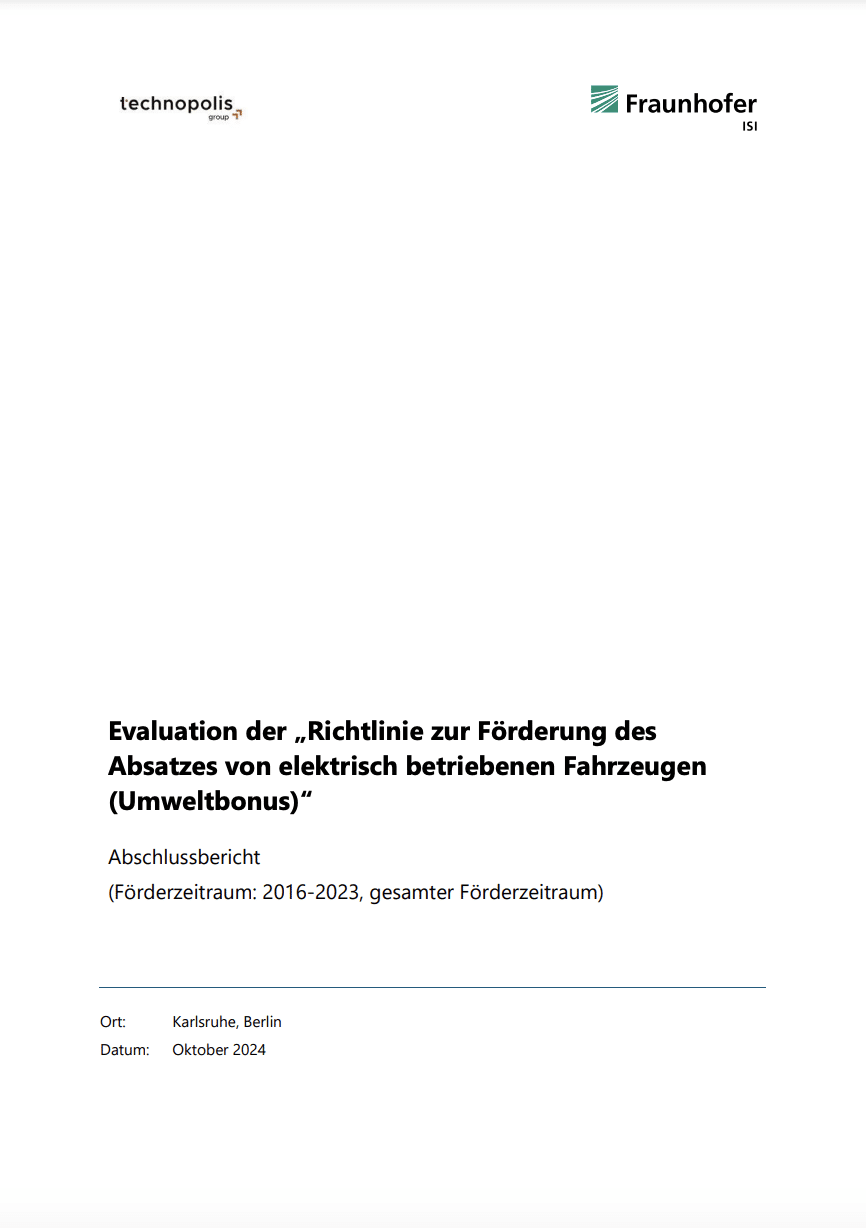Evaluation of the ‘Directive to promote the sale of electrically powered vehicles (environmental bonus)’
Publicatiedatum: 4 november 2024 | Taal: DE
The ‘Directive to promote the sale of electrically powered vehicles’ (environmental bonus) was a funding programme to support the electrification and decarbonisation of road transport in Germany for the years 2016 to 2023. In light of the German government’s goal of having 15 million battery electric vehicles on the road by 2030, the environmental bonus was intended to help gradually replace the fossil-fuelled car fleet with electrically powered vehicles during the market ramp-up phase.
The Technopolis Group evaluated the funding programme on behalf of the Federal Ministry for Economic Affairs and Climate Protection (BMWK) together with its project partner, the Fraunhofer Institute for System and Innovation Research (Fraunhofer ISI).
With the environmental bonus, private households and companies were granted a financial subsidy when purchasing or leasing an electrically powered vehicle. State subsidies totalling 10.2 billion euros were approved, which were used to promote the registration of around 2.17 million electrically powered vehicles. Of these, 1.40 million were for the registration of battery electric vehicles and 0.77 million for plug-in hybrid vehicles. In addition, the manufacturers contributed a further 5.28 billion euros to the funding.
Overall, the results of the evaluation show that the environmental bonus has made a substantial contribution to the electrification and decarbonisation of road transport. In the 2016-23 funding period, GHG emission savings totalling 7.3 Mt CO2-eq. (gross) were identified. After adjustment for deadweight and pull-forward effects as well as direct rebound effects, 4.5 Mt CO2 eq. (net) of this is directly attributable to the programme. By continuing to use the subsidised vehicles over their entire service life, cumulative GHG savings of 44.0 Mt CO2 eq. (gross) (27.6 CO2 eq. net) will be achieved by the 2030s.
The evaluation shows, among other things, that the promotion of battery electric vehicles saves significantly more GHG emissions than the promotion of plug-in hybrids. In addition, the calculation of the savings over the entire service life benefits from the ongoing decarbonisation of the electricity grid.
With regard to the economic efficiency of the measure, the evaluation revealed an overall funding efficiency of 319 euros per tonne of CO2 eq. over the entire funding period and across all funded electric vehicle types (battery electric vehicles and plug-in hybrid vehicles).
Socio-demographic aspects were also analysed as part of the evaluation. This showed that there are considerable regional differences in the utilisation between the old and new federal states, with less use being made of the funding in the eastern federal states. In addition, the subsidy was utilised disproportionately by households with a higher net household income, which indicates an undesirable distributional effect.
The full evaluation results can be found in the published final report of the evaluation.




